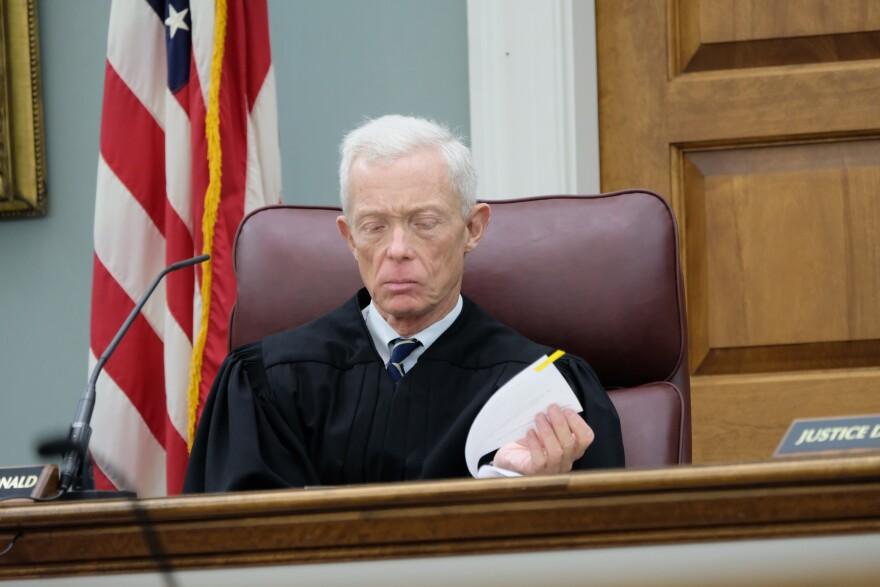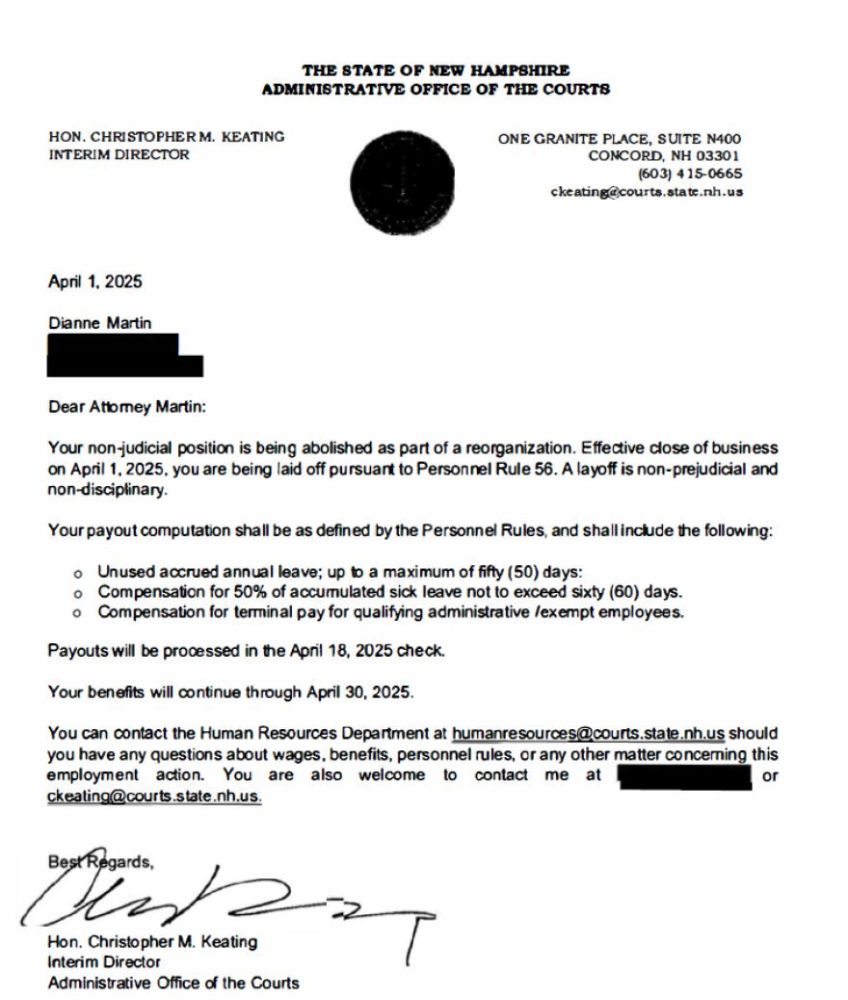
Todd Bookman / NHPR New Hampshire Supreme Court Chief Justice Gordon J. MacDonald presiding over arguments Oct. 15, 2025. (Todd Bookman photo / NHPR)
When Gordon MacDonald was New Hampshire Attorney General, he tapped Dianne Martin, a lawyer at the Department of Justice, to serve as his chief of staff.
Two years later, when MacDonald became chief justice of the New Hampshire Supreme Court, Martin followed her former boss, taking a top job working for him as head of the court’s administrative office.
In April of this year, Martin landed yet another high paying job under MacDonald: overseeing applications for those hoping to practice law in New Hampshire.
But instead of Martin transferring directly into that position, something strange took place. Martin was laid off from state government for two days, then immediately rehired.

New Hampshire Department of Justice Dianne Martin, left, served as Gordon MacDonald's chief of staff at the Attorney General's office. She would follow him to the New Hampshire Supreme Court, after he was confirmed as the court's chief justice. (Photo from 2019)
While this 48-hour gap in Martin’s employment may have seemed just a technicality — a bureaucratic blip — it was also lucrative. It allowed her to cash out unused sick and vacation time, and other benefits, for a total payment of nearly $50,000. Typically, state employees are only able to cash out their unused sick and vacation time when they retire or are laid off.

Before she began her new role as general counsel, Martin was laid off for 48 hours, allowing her to collect her unused sick and vacation benefits, totaling nearly $50,000.
The payout came at a time when the New Hampshire judiciary was facing a budget crisis. In the same month that the payouts were made, the chief justice announced a hiring freeze, and warned of looming layoffs if state budget writers slashed any more funding.
The unusual personnel move — which NHPR confirmed through state payroll records, personnel files and at least one complaint made by a state employee — has not been previously made public. At least one whistleblower alleges the layoff and immediate rehiring was done at Martin's request, with the assistance of MacDonald. That person called it the “chief’s idea.”
NHPR sent a detailed list of questions to the New Hampshire Judicial Branch about the payments and whether MacDonald had any role in orchestrating Martin’s personnel moves. A court spokesperson declined to answer specific questions, saying only that “the New Hampshire Supreme Court oversees all personnel decisions within the Judicial Branch and does not comment on any matters involving personnel.”
The moves are raising questions among some in state government. New Hampshire state Rep. Ross Berry, a Republican from Weare, said the personnel maneuver was “concerning” and said he would support holding a legislative hearing to question judicial officials about Martin’s payout.
“This isn't something that I think you can allow the courts to just handle themselves,” said Berry. “You're talking about a significant amount of taxpayer money.”
The ‘Chief’s Idea’?
While Martin’s most recent job titles may sound obscure, she’s in fact held two of the most important behind-the-scenes roles in the state Judicial Branch over the past year. As director of the Administrative Office of the Courts, she was responsible for running the business end of a sprawling court system — overseeing spending, human resources, communications, court security, IT, and more. In her current position, as head of the Office of Bar Admissions, she’s in charge of the process by which new lawyers get approved to practice in the state.
While Martin has largely worked under the radar in these positions, her movement between the two roles is laid out in a series of internal personnel records and publicly available payroll figures.
After the New Hampshire Judicial Branch announced that Martin would no longer serve as director for the Administrative Office of the Courts, she was offered a new job overseeing the Office of Bar Admissions. Her offer letter for that position was dated March 27, with a proposed start date for the following week, at a salary of $154,109.
But instead of directly transitioning into that position, the Judicial Branch instead laid Martin off on April 1 — five days after she was offered the new job — according to a second letter obtained by NHPR. That letter refers to a “reorganization” within the judiciary and the abolishment of her position.
Then, she was rehired and began her new position on April 4.
The 48-hour layoff, lasting April 2 to April 3, cleared the way for Martin to cash out her unused sick and vacation time, which were valued at $43,548. She also received $6,307 in “termination pay,” based on her length of employment at the Judicial Branch.
How NH Public Radio Reported This Story
We used multiple sources to ensure the accuracy of our reporting about the $50,000 payout and the moves that preceded it. That included publicly available government payroll records and internal personnel records that we verified with multiple people with experience working in state government. We also obtained records of a whistleblower’s complaint about the transaction through a Right to Know request. We offered Judicial Branch officials the opportunity to respond to the facts reported in this story, which they declined.

Record obtained through Right to Know request A whistleblower alleges that Chief Justice Gordon MacDonald helped orchestrate a $50,000 payout to a top ally.
Martin’s shuffling between positions is highly unusual, according to four people with experience in human resources for New Hampshire state government who have reviewed the matter at NHPR’s request. One described the chain of events that culminated in Martin cashing out her benefits only to immediately begin a new job with the same state agency as “suspicious.” (NHPR is not quoting these people by name as they expressed concern about the potential ramifications of criticizing top state officials.)
The irregular transactions did not go unnoticed, though. One whistleblower was so concerned about the payouts to Martin that they notified a top personnel official with the New Hampshire Department of Administrative Services, which oversees the state’s payroll processing.
Handwritten notes from that conversation obtained by NHPR through a public records request show that the employee believed that the moves were the “chief’s idea,” an apparent reference to MacDonald. “Chief wants to lay her off for a week and then rehire her into a new role,” the whistleblower said.
The whistleblower — who declined to speak with NHPR for this story — alleged that Martin wouldn’t agree to a straightforward transfer into the new job. “Dianne won’t accept the transfer because she wants the layoff payout $,” the whistleblower told the Department of Administrative Services official, who documented their conversation. The whistleblower’s concerns were forwarded internally to other officials within that agency, but don’t appear to have been shared with the New Hampshire Department of Justice.
When asked about any follow up made by state officials to the whistleblower’s concerns, a lawyer for the Department of Administrative Services said “it would be improper for us to comment on the actions of another branch of government.”
The Judicial Branch also did not respond to a series of questions about why Martin was laid off for two days and then rehired, or if the moves were coordinated by the chief justice.
It isn’t clear if the maneuvers that resulted in Martin’s payout violate any state laws or the judiciary’s personnel rules, or if MacDonald’s alleged involvement may run afoul of the state’s Code of Judicial Conduct, which instructs judges to avoid even “the appearance of impropriety” in their actions.
A spokesperson for the Attorney General’s office said the office had no comment on if it was aware of or currently investigating Martin’s personnel moves or MacDonald’s alleged involvement.
Over the past decade, Gordon MacDonald has ascended to the top position in New Hampshire’s legal world. And for much of that time, Martin has worked closely with him.
MacDonald and Martin first became colleagues in 2017, when he was appointed by former Gov. Chris Sununu to serve as New Hampshire Attorney General. At the time, Martin was a lawyer at the Department of Justice assigned to the transportation and construction sector.
In 2019, MacDonald elevated Martin to serve as his chief of staff. The job came with more responsibilities for Martin, and a nearly $25,000 jump in pay. Martin would oversee day-to-day operations of the Department of Justice, including recruitment and retention of staff attorneys, as well as work on special projects.
Her time as chief of staff was brief, though. Later that year, Sununu nominated Martin to serve on the Public Utilities Commission, an influential state agency that in part oversees major utility expansions and electricity pricing.
During a public hearing on her nomination, officials from across state government praised Martin. In her opening remarks, she told the Executive Council that watching her parents raise nine children instilled in her the value of hard work, and the need to be nice.
“That’s a lot of personalities in one household,” she joked.
But two years into her six-year term at the Public Utilities Commission, Martin left that job to rejoin MacDonald – her former boss – who had since been confirmed as chief justice of the state Supreme Court. This time, MacDonald hired Martin to lead operations for the entire Judicial Branch. MacDonald announced the hiring in a press release, saying that Martin was “especially well prepared” for the role.
 The New Hampshire Supreme Court building in Concord, NH. (Todd Bookman/NHPR)
The New Hampshire Supreme Court building in Concord, NH. (Todd Bookman/NHPR)
The job came with another jump in pay: a salary of more than $143,000, compared to approximately $130,000 that Martin was paid as a utilities commissioner.
As director of the court’s administrative office, Martin was tasked with overseeing the judiciary’s operations, as well as special projects, including an initiative championed by MacDonald aimed at improving the court’s response to people with mental health concerns who become involved in the criminal justice system.
But in early March of this year, the New Hampshire Supreme Court issued an administrative order announcing that Martin had departed from the director job, without providing any explanation, including whether she was forced out of the position. Circuit Court Judge Chris Keating was announced as her interim replacement. Salary records show that Martin remained on the state’s payroll for nearly a month, however, until April 1.
On March 27, she was formally offered the new position as general counsel leading the Judicial Branch’s Office of Bar Admissions, with a start date of April 4, according to a job offer letter signed by Keating. In the new role, she would oversee the application and review process for people seeking to practice law in New Hampshire, including recent law school graduates.
Martin’s position would be fully remote, the standard probationary period was waived, and she would see no gap in her health insurance coverage. And MacDonald would again be her direct supervisor.
NHPR asked Keating if he was instructed to offer Martin the position by MacDonald. He declined to comment, and instead referred to the judicial branch’s statement.
Weeks into her new role, MacDonald submitted a request for a pay increase for Martin, according to a separate document obtained by NHPR. He cited her skills and experience, as well as her “working relationships in the Judicial Branch.”
Publicly available state payroll information shows that on April 18, Martin received her normal paycheck, along with an additional $49,856, a result of the liquidation of her unused sick, vacation and termination pay.
‘Tough choices’
Martin’s payout came at an unusually fraught time for the Judicial Branch.
Throughout the winter and spring of this year, MacDonald was warning state budget writers about the impact any proposed cuts would have on the state’s justice system, including the closure of courthouses or delays in jury trials.
“Tough choices,” MacDonald told members of a key House budget committee as he explained the impacts of possible cuts, including to court security, in the face of a slashed budget. “It’s not ideal.”
The branch’s financial picture was so bleak that in April — the same month that Martin received her payout and raise — MacDonald announced a hiring freeze for all but the most critical court positions. He also warned about possible layoffs in the future.
The Judicial Branch did not respond to questions about its finances, or why it chose to offer Martin a raise in her new position at the same time it was warning lawmakers about the possible need for court closures.
Despite pressure to cut costs, when Martin took over her new job, she wasn’t the only one being paid to fill the role. For the previous 14 years, Sherry Hieber oversaw the application process to practice law in the state, but in early 2025 she told court leadership about her plans to retire.
In an announcement posted on the court’s internal messaging system, MacDonald told branch employees that Hieber and Martin would overlap during a transition period expected to last a “few months.”
Payroll records show that Martin and Hieber — both earning salaries of more than $154,000 — ended up holding the same job for five months, ending in early September when Hieber received her last state paycheck.
A Judicial Branch spokesperson declined to explain why it paid two people for a job previously performed by one person for nearly half a year, or if it violated its own personnel policies, which appear to cap “overlapping appointments” at a maximum of two weeks.
A benefit for one
Martin — a top state official with close ties to the chief justice — appears to have been able to arrange a benefit that other public employees are not able to access.
Rich Gulla, president of the SEIU, the largest public employee union in the state which represents some rank-and-file Judicial Branch employees, said that his members are not permitted to cash out their benefits while switching jobs, as Martin was allowed to do, under the terms of the union’s contract.
He called Martin’s brief layoff and subsequent rehiring “peculiar,” and said other state employees deserve an explanation.
“I think that they deserve to know that the people running the departments are operating in an ethical manner,” said Gulla. “This is very concerning.”
In addition to calling for a public hearing, Rep. Berry said the payout to Martin could spur a move among lawmakers to ensure this type of payment does not occur in the future.
“The courts are going to look at it and say, was it legal? So I think as an elected official, my response would be, ‘Well, let's try to make it illegal because you shouldn't be doing this,’ ” said Berry. “Just because you can doesn't mean you should.”
Berry also praised the whistleblower for trying to shed light on the payments.
According to documents obtained in a public records request, that person followed up their initial phone call with an email to a human resources official in another state agency a week later. The person said that their “moral compass” would no longer let them work in the New Hampshire Judicial Branch, where there is “zero accountability for unethical behavior.”
“The NHJB will see fallout from these moves,” they wrote.
These articles are being shared by partners in the Granite State News Collaborative.Don’t just read this. Share it with one person who doesn’t usually follow local news — that’s how we make an impact. For more information, visit collaborativenh.org.
